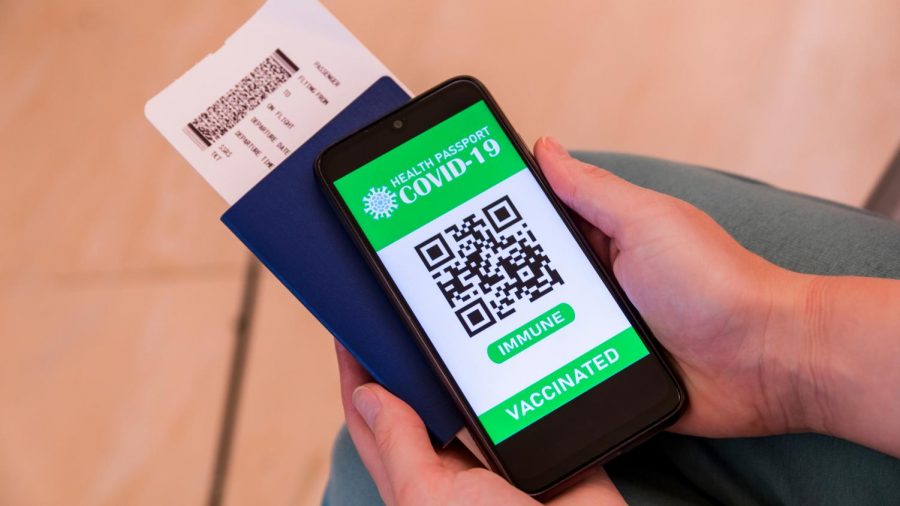The vices of a vaccine passport
Vaccine passports seem helpful in theory, but harm minority groups and developing nations in practice
As cases are beginning to rise again, many are eager to more strictly separate the vaccinated from the not. Due to the efficacy and safety of Covid-19 vaccinations (proven by a full FDA approval for Pfizer), the possibility of vaccination passports – authentication for entry into large gatherings or travel – has emerged and arguments over their morality have intensified. The United States, the United Kingdom and the European Union are playing with the idea; nations like Australia, Sweden and Denmark have approved their implementation; and Israel and New York City are already issuing their versions of vaccine passports to their citizens.
The discussion surrounding vaccine passports is much more complex than whether or not you’re pro-vaccine, as questions regarding feasibility, privacy protection, and equity arise. In theory, I am absolutely in favor of mandating a system that allows a safe return to normal, but questioning the practicality or unintended implications of vaccine passports is important, and we must proceed with extreme caution into the realm that is international, digital vaccine verification.
As we increase the availability of vaccinations in underserved populations and the FDA fully approved Pfizer’s vaccine, we are moving in a direction where the majority of unvaccinated Americans only remain so by choice.
If a primary principle of public policy is that governments should choose the least infringing option when determining how to approach a public health issue, it may soon become unethical for us to expect those who are unlikely to spread the virus to stay inside and overcompensate for Americans who won’t get the vaccine. Additionally, safely returning to normal would welcome both economic and mental health advantages. Fully vaccinated Americans are eager to get back to some sort of normalcy, and a vaccine passport is a promising way of achieving that.
However, the majority of developing nations are far from the levels of immunity in America; vaccine passports that allow Americans to waltz their way into areas where Covid-19 is rampant are not only inconsiderate, but could also expose Americans to variants that their vaccines are unprepared to fight. Besides communities with limited access to vaccinations, many are unable to receive a vaccine due to preexisting health conditions or allergies. Further, according to The British Medical Journal, pregnant women were underrepresented in vaccination trials, which has (understandably) led to significant hesitancy in their demographic. Additionally, hesitancy in certain minority groups (whether that be due to limited access, disinformation campaigns, inability to prioritize vaccinations, or distrust in medical systems that have previously wronged them) still poses an issue. These groups deserve support, sympathy, and intervention, and creating some sort of unattainable passport rather than focusing on the root causes of their lack of vaccination is irresponsible and immoral. We are simply too far from the point where all remaining unvaccinated people are just conspiracy theorists, and vaccination passports could quickly become a moral failure–exacerbating inequity–if we do not tread carefully.
Further, the implementation of vaccine passports would be no easy feat. The World Health Organization hasn’t yet endorsed vaccine passports because there is no set plan for how to develop an internationally standardized, digital credential that is immune to privacy breaches or forgery.
Obtaining a vaccine passport (which will likely be digital), will require internet access and ask for a fair bit of personal information. Besides ensuring that everyone’s data and medical records are kept safe, the means to pay for these passports and a lack of internet access in developing nations would make the process even more inequitable. Additionally, people are already arguing about the legality of workplaces, airlines, or entertainment companies requiring access to vaccination information. Simply put, without incredibly careful development and attention to detail, vaccine passports could become an elitist, data-breaching mess.
Don’t get me wrong. There’s nothing I’d love more than an app on my phone that I can show an airline or concert venue, but there’s something incredibly evil about developing a system that perpetuates inequality in order for affluent families to flock to tropical beaches or attend concerts. If we do decide to mandate vaccine passports, we must do it in a way that doesn’t put developing nations with limited vaccine access, hesitant minority groups, those with allergies or health conditions that are unable to get vaccinated, the less digitally literate, or the poor at a disadvantage. In a pandemic that has hit marginalized communities far worse than it has the wealthy, it’s imperative that we question who vaccine passports will work for, and who they will work against.




